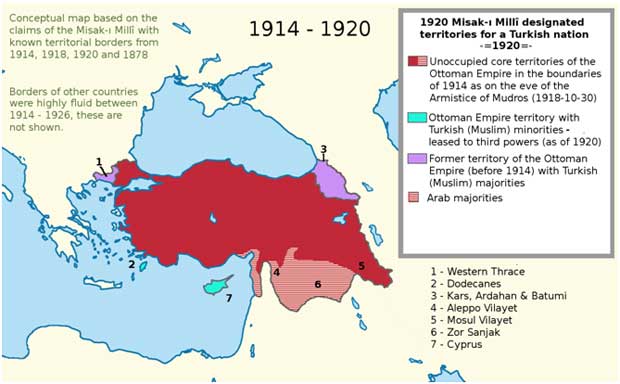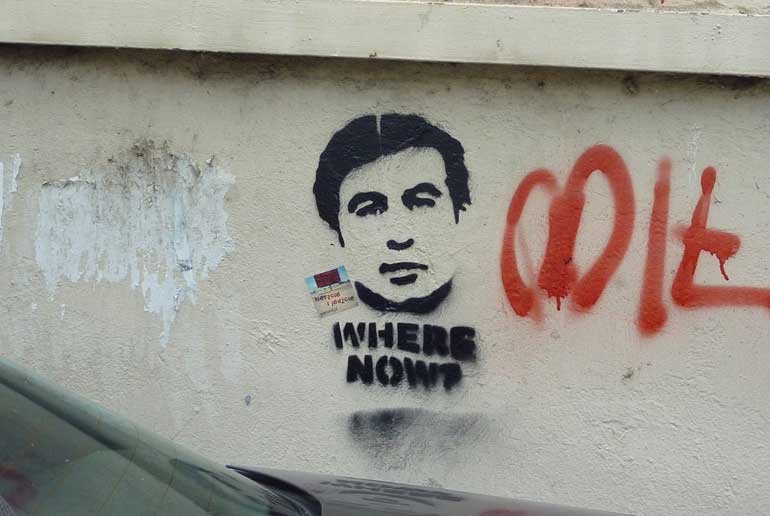Modern diplomacy does not imply one should ignore the lessons of contemporary history. Nor should one sacrifice prudent long-term policies for the perception of short-term national gains. Both may have taken root in Mikhiel Saakashvilli’s reign in the Republic of Georgia. An observer might wonder why Georgia has put itself in positions that have reduced its sovereignty.
Sovereignty does not simply represent the relative extent to which the military and economic power of a state is measured, but rather it is the capacity of a state’s power and right to act. Clearly, sovereignty can be projected beyond the recognized physical bounds of a state.
In January 2004, Saakashvilli became the president of Georgia, riding the wave of the Rose Revolution, predicated on ridding the country of endemic corruption, removing Russian military bases from Georgian territory, and centering on European integration and NATO membership. While many of these goals might be laudable, what appears as an underlying assumption by Saakashvilli and others is by acting the part of a surrogate, the west will automatically embrace all that is in Georgia’s interest. The folly of such assumption was made clear in 2008 when events in South Ossetia degenerated into a short mini-war between Russia and Georgia. With Georgia on its own, it lost sovereignty over South Ossetia and Russia recognized the independent status of former Georgian regions of Abkhazia and South Ossetia.
During the Saakashvilli years, citizens of Turkey were given Georgian citizenship by claiming they were of Georgian ethnicity by, for example, speaking a few words in Georgian. [1] Many of these dual citizens set up shop in Batumi on the Georgian Black Sea coast where there is a clear Turkish flavor to Batumi today. Others opened businesses throughout Georgia, mainly in Tbilisi. In the short term this might not be an issue. However, Saakashvilli set up conditions in Batumi something akin to what took place in the region of Alexandretta, the once French-administered, mainly Arab populated Mediterranean coastal province of post-WWI Syria. Saakshvilli’s policies did not take two important items into account: the very dynamic nature of states in regional relations, and the existential expansionist tendency of Turkey. The latter is expressed today as neo-Ottomanism, which has always existed since the very early 1920s. In 2004, who would have thought the somewhat secular nature of Turkey would be transformed into a near-Islamic state within a decade? In any case, it should have been predicted. Part of national strategic planning is to understand the forces, sometimes hidden just under the surface, which could potentially end up working against state interests, decades in the future. In Georgia, such planning was firmly centered on NATO membership, uber alles. Saakashvilli’s strategic long-term planning was in fact short-term opportunism.
Turkish Policies
Since the 1920s, Turks have claimed lands as far apart as Bosnia, Bulgaria, Crimea, Georgia, Armenia, Azerbaijan, Iraq, Syria, and all of Cyprus. [2] This was based on what was known as Misak-ı Millî, or National Pact. See map. Only last year, Turkish President Erdogan questioned Greek sovereignty over the Dodecanese Islands and the mayor of Ankara added all of the Greek Aegean to Erdogan’s list. [3] All these claims could be dismissed as political rhetoric, but Turks have traditionally used such statements as trial balloons, gauging the degree of international response. Countries with transformational or expansionist agendas wait for opportunities to execute their plans, and Turkey has been rather successful with this strategic policy; its trail is briefly reviewed below.

The Republic of Turkey’s borders according to the National Pact [4]
Alexandretta cum Hatay
During the lead-up to WWII, anti-fascist powers sought political allies, for much of the world was fracturing between fascist and non-fascist camps. With French officials looking the other way, a fraudulent referendum employing also Turkish soldiers and tens of thousands of imported Turkish citizens, a joint French- and Turkish-administered pseudo-republic of Hatay was “voted” into being in 1938. This pseudo-republic was formerly known as the Mediterranean coastal region of Alexandretta under the French Syrian Mandate. France relinquished control of this region solely to Turkey in late 1939. The pseudo-republic did not have a Turkish majority; rather, it was 60% non-Turk. In a quid pro quo with France, Turkey agreed not to enter WWII on the side of Nazi Germany. However, within two years, Turkey signed a friendship treaty (Türkisch-Deutscher Freundschaftsvertrag) with the Nazis. Subsequently, “neutral” Turkey supplied the majority of Germany’s chrome and other essential material aiding the Nazi war effort. Turkey exited WWII with a larger landmass and eventually joined NATO in 1952.
Cyprus
In 1974, Turkish armed forces invaded and eventually occupied about 40% of the Republic of Cyprus. Although not an outright annexation, the Turkish occupation continues to this day, backed by 40,000 soldiers. As with Alexandretta/Hatay in 1939, Cyprus was a right-time/right-place venue with prevailing conditions in favor of a Turkish invasion and subsequent occupation. After years of Greek-Turkish ethnic strife on this island subsequent to its 1960 independence from the UK, Turkey had its plans ready, only requiring the right conditions for their implementation. On July 20, 1974, Turkish troops invaded Cyprus, five days after a coup d’état in Nicosia, the Cypriot capital. The coup’s goal was Cyprus’ annexation with Greece. Great Britain was a guarantor of the island’s sovereignty. US Secretary of State Henry Kissinger strongly lobbied against a British military operation that would have preempted the second Turkish invasion while Article IV of the 1947 agreement between Turkey and the United States required Turkey to obtain US consent to use its military assistance for something other than it was furnished. [5] Clearly, the guarantor of Cyprus’ sovereignty had other plans as thousands of British troops stationed in Cyprus didn’t interfere with the Turkish invasion while the US spoke out of both sides of its mouth.
Within a couple of weeks, Greece’s ruling military junta collapsed and Turkey invaded the island again, expelling nearly 150,000 Greeks from the north of the island. Eventually, Turkey imported 150,000-160,000 settlers from mainland Turkey into the northern occupied zones, as well as absorbed ethnic Turks living south of the front lines. This enabled the 18% Turkish population of the island to grab almost 40% of its land mass. Since the formative days of the Turkish Republic, an undertone of Turkish designs on Cyprus existed. The north of the island is referred to as the Turkish Republic of Northern Cyprus, an internationally unrecognized entity.
Abkhazia
In September 2009, Unal Cevikoz, the Deputy Under Secretary for Political Affairs in the Turkish Foreign Ministry met with the Abkhazian Foreign Minister Sergey Shamba in Abkhazia. An offer of Turkish recognition of Abkhazia in exchange for Russian recognition of the Turkish Republic of Northern Cyprus was denied by Russia of any such quid pro quo. Turkey’s Abkhazian lobbies were pushing for recognition, making a striking parallel to events in Northern Cyprus. [6] Quoting Today’s Zaman, September 17, 2009 [7],
“During a period in which Abkhazia’s independence process has begun to gain momentum, Cevikoz could not have gone to Sukhumi to engage in efforts to restart a peace process between Abkhazia and Georgia. Therefore, we can presume that, to prevent Abkhazia from unifying any further with the Russian Federation, Ankara may have asked Tbilisi to allow a controlled relationship with Abkhazia. To be more explicit, the door may be opened to preventing Georgia from intercepting ships on humanitarian missions or those involved in trade traveling between Turkey and Abkhazia using the Black Sea.”
Further it was argued
“…Ankara sees that a close relationship with Abkhazia would eventually produce a similar multi-dimensional relationship with Cypriot Turks in the eastern Mediterranean. Abkhazia in this case would become an accessible Black Sea coastline for Turkey.”
Turkey was attempting to preempt a closer Russian relationship with Abkhazia by offering its own close relationship.
Armenia
On two occasions, October 6 and 7 of 2015, Turkish military helicopters violated Armenian airspace. NATO ignored the incident, which was clearly designed to send a message to the Russians, whose interests in Syria – at the time – were not in line with those of Turkey. This culminated in the Turkish shoot-down of a Russian SU25 only six weeks later. The resulting war of words, Russian sanctions of Turkish products and services, as well as a break in relations changed when Russian and Turkish Syrian interests just happened to line up a year later.
Adjaria
Late last year, Turkey made it known that based on their Turkish National Pact and a parochial interpretation of 1921 Treaties of Kars and Moscow, the Autonomous Georgian Republic of Adjaria, with the major Georgian Black Sea port of Batumi, will revert to Turkish jurisdiction in 2021. [8] Various maps and interpretations exist regarding such claims. [9]
Erdogan, in a speech at Rize University in Turkey, said, [all parentheses mine]
“Our physical boundaries are different from the boundaries of our heart … and I am asking you Rize my dear bothers. Is it possible to separate Rize from Batumi? Or is it possible to think Edirne (far NW Turkey on the Greek border) apart from Thessaloniki (in Greece proper) or Kardzhali (in Bulgaria, just west of Edirne)?” [10]
It is unknown what prevailing regional conditions may exist in 2021. Perhaps Turkey will make no demands, or it will come to some agreement for even a stronger relationship with Adjaria. Will conditions deteriorate in Turkey where their irredentist reaction would be to protect “our Adjarian brothers and Turkish investment in Batumi?” Erdogan’s words may be dismissed but what cannot be dismissed is long-term Turkish planning.
The success Turkey has had in expanding its landmass and regional influence, combined with the vagaries of state interests coinciding makes one wonder what Saakashvilli was thinking when he basically opened Batumi for heavy Turkish investment. In the short term, it may have had a positive effect on the economy of Batumi. However, in the long term, Georgia has opened up the gate to an increased Turkish influence in Adjaria where, given the right conditions, a Turkish occupation would be agreed to by other regional powers. This is not out of the realm of possibility considering events over the past hundred years. A Turkish firm, TAV Tepe-Akfen-Vie, has been awarded management control over Tbilisi and Batumi airports. [11] Are not Georgians able to run their own airports? [12] How much more of Georgia’s sovereignty is being bargained for short-term gain?
With east-west pipeline routes that crisscross Georgia, which clearly concern Azerbaijan and Turkey, one has to wonder why the May 23, 2017 meeting of Georgian, Azerbaijani, and Turkish defense ministers was allowed to take place in Batumi. The meeting resulted in closer military cooperation. What message was being interpreted by long-term Turkish planners? The Georgian track record includes Tbilisi having already acquiesced to both Azerbaijani and Turkish pressure on Georgian control over its section of the proposed Baku-Tbilisi-Kars railroad. [13]
Earlier this year, the Georgian government suspended the license of Batumi’s Refaiddin Shahin Friendship School. [14] This institution was part of the Gulen school system sponsored by Muslim cleric Fethullah Gulen, accused by Turkish President Erdogan of being behind the July 2016 attempted Turkish coup d’état. Georgia granted Turkey’s demand for the school to be shut down and replaced with a new school supervised by the Turkish Ministry of Education. [15] Note the venue. One might ask where the Georgian flag is; this being Batumi, after all.
On June 21, 2017, Kutaisi Street in Batumi was blocked off for a Turkish celebration with Turkish flags flying everywhere, and there were no Georgian flags to be seen. [16] There are repercussions, some irreversible, upon confusing long-term strategic planning with short-term tactical opportunistic decisions made a decade ago.
Marnueli
Both Iran [17] and Turkey are competing for influence in the Georgian Marnueli region of southern Georgia, which is demographically a Shia-Muslim Azerbaijani-speaking majority. While Iran has not engaged in expanding its borders for centuries, the Turkish army completed the modernization of Georgia’s Marneuli airfield. [18] Starting from March 2000, Turkish warplanes could use this Marnueli airbase in an agreement signed by Eduard Shevardnadze. [19] The question is not who will win influence in Marnueli, but how much Georgia may have already lost.
Georgian Public Reaction
The Georgians themselves have reacted to such encroachment. Last September, a riot-like rampage erupted on Aghmashenebeli Street in Tbilisi with clear anti-Turkish overtones. [20] This street has many Turkish-owned businesses and the rampage resulted in a lot of property damage.
Nerves got frayed in Batumi during April of 2016 [21] when a Turkish land owner was accused of destroying the wall of a church. Although details were not clear, such reaction was magnified by the efforts associated with the construction of a second mosque in Batumi, specifically of the Turkish-Ottoman style. This controversy has been brewing for over five years. Former Prime Ministers Bidzina Ivanishvili promised to build the second mosque in 2012 and his successor Irakli Garibashvili promised to look into this request.
Turkish Defeat at Didgori, Turkish Victory in the Georgian Parliament
On March 23, 2017, the Georgian Parliament approved the first hearing of the Didgori War Day, August 12, as “Great Victory Day”. [22] This celebrates the Georgian victory over Seljuk Turk invaders on August 12, 1121. However, at the request of the Turkish government, the Georgian parliament suspended discussions on making this Georgian victory a national holiday, claiming such a decision will result in “unpleasant relations”. Georgian PM, Nuktri Kantaria noted [in translation],
“Unfortunately, we are a small country, we do not have imperial intentions, and we do not try to put someone else under our influence. That’s why we have diplomacy, we have to tread carefully on the edge, so we will not lose anything and harm the country’s perspective. Turkey is our huge neighboring state, it has the capability to substantially increase tensions with us. Turkey does not recognize Abkhazia or Samachablo [South Ossetia] as independent countries, we are grateful for that, and has no pretensions on Adjara; however, the national perception document is clearly written that Adjara is its [Turkish] territory. The Kars Treaty has no time limit and this agreement clearly states that Georgia conceded land to Turkey in 1921. In other words, these lands were mine and were conceded to you, not that justice has been restored. There are a lot of things we need to use a little bit of intelligence for their resolution.”
This bill will come up for parliamentary discussion in July. Its outcome will be interesting, for the “Great Victory Day” defined the survival of the Georgian nation. The Georgian Parliament will have to decide what is more important for them, the celebration of national survival or serving Turkish whims. They are, in fact, mutually exclusive.
[1] „გაუგებარია, რატომ მისცეს თურქეთის მოქალაქეებს საქართველოს მოქალაქეობა“ [2] Turkey’s New Maps Are Reclaiming the Ottoman Empire [3] Ankara’s mayor claims all the Greek islands as Turkish property [Map] [4] Deliogul at the English language Wikipedia, CC BY-SA 3.0 [5] Turkey’s Foreign Policy in Transition: 1950-1974, 1975, Kemal Karpat, page 33 [6] What is Turkey Doing in Abkhazia and Turkey and Georgia: Zero-Problems?, page 4[7] Turkey Considers the Status of Abkhazia
[8] Erdoğan’ın sözünü ettiği Misak-ı Milli nedir?[9] Turkey’s Misak-i Milli and Caucasus
[10] “We Are Present in the History of Mosul” [11] Georgia Airport Profile [12] New Airport Terminal Opened in Tbilisi [13] The silk & steel road through the Caucasus [14] Georgia: Gülen School Loses License [15] Turkey opens first state school in Georgia’s Batumi [16] Events in Batumi June 21, 2017 [17] Iran Builds Soft Power in Georgia to Foster Tighter Nexus With Russia [18] Turkey and Georgia: Strategic Connections [19] Turkish Foreign Policy in the Post-Cold War Period, Nasuh Uslu, Nova Publishers, 2004, page 72 [20] შსს – სამართალდამცველებმა „მარჯანიშვილზე“ არასანქცირებული, აგრესიული მსვლელობა დაშალეს და 11 პირი დააკავეს [21] ბათუმში თურქმა ბიზნესმენმა ეკლესიის გალავანი დაანგრია [22] თურქეთის საელჩოს თხოვნით პარლამენტმა დიდგორის დღის უქმედ გამოცხადებაზე კანონპროექტი შეაჩერა


